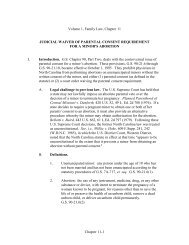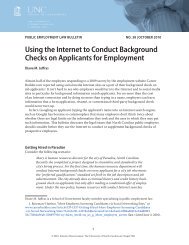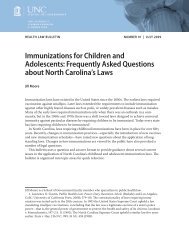Sentencing, Corrections, Prisons, and Jails - School of Government ...
Sentencing, Corrections, Prisons, and Jails - School of Government ...
Sentencing, Corrections, Prisons, and Jails - School of Government ...
Create successful ePaper yourself
Turn your PDF publications into a flip-book with our unique Google optimized e-Paper software.
236 North Carolina Legislation 1998<br />
another person. Such transferred property, under G.S. 15A-1340.28(c), is not subject to the stay <strong>of</strong><br />
execution that applies to the defendant’s property during probation. In other words, the clerk may issue<br />
a writ <strong>of</strong> execution against the transferred property without awaiting termination or revocation <strong>of</strong> the<br />
probation.<br />
If the restitution is not a condition <strong>of</strong> probation (for example, if it accompanies an active sentence),<br />
it is subject to collection as a civil judgment. However, under G.S. 15A-1340.26(b), the date when the<br />
civil debt is collectable presumably would depend on the payment date or payment schedule set by the<br />
sentencing judge.<br />
The provisions regarding civil docketing <strong>of</strong> restitution orders apparently supersede the procedures<br />
<strong>of</strong> present G.S. 1-15.1 with regard to the serious <strong>of</strong>fenses covered by Article 45A <strong>of</strong> G.S. Chapter 15A.<br />
G.S. 1-15.1 concerns a civil action for damages filed by a crime victim against the <strong>of</strong>fender. It tolls the<br />
statute <strong>of</strong> limitations for the action from the time the restitution order is entered until it is paid in full. It<br />
also provides that at the civil trial, the defendant may contest the amount <strong>of</strong> the damages, <strong>and</strong> the<br />
amount <strong>of</strong> the restitution order is not admissible in evidence. This statute presumably continues to<br />
apply to <strong>of</strong>fenses not covered by the victims’ rights legislation.<br />
The legislation makes other important changes regarding execution <strong>of</strong> a restitution order as a civil<br />
judgment. It amends G.S. 1-234 to make clear that a restitution judgment docketed under new<br />
G.S. 15A-1340.28 constitutes a lien against the defendant’s property. Furthermore, it alters G.S. 1C-<br />
1601(e) to remove the G.S. Chapter 1C, Article 16 exemptions <strong>of</strong> property from execution <strong>of</strong> a criminal<br />
restitution order under G.S. 15A-1340.28. G.S. 1C-1601 exempts from creditor’s claims portions <strong>of</strong> the<br />
value <strong>of</strong> certain property—for example, the debtor’s residence, motor vehicle, pr<strong>of</strong>essional tools, <strong>and</strong><br />
personal household furnishings. These kinds <strong>of</strong> property will now be subject to execution <strong>of</strong> a<br />
restitution judgment.<br />
Section 19.4(d) <strong>of</strong> S.L. 1998-212 also amends G.S. 7A-304(d) to change the priorities for<br />
distribution <strong>of</strong> funds paid to the clerk <strong>of</strong> court for fines, court costs, <strong>and</strong> restitution. Restitution<br />
payments to the victim will now have top priority in distribution, ranking ahead <strong>of</strong> costs to the county<br />
or city <strong>and</strong> fines to the county school fund.<br />
Crime Victims Compensation<br />
The Crime Victims Compensation Act, G.S. Chapter 15B, enacted in 1983, created a Crime<br />
Victims’ Compensation Commission that, under certain circumstances, may compensate crime victims<br />
for economic loss caused by the crime. S.L. 1998-212 (S 1366), Section 19.4(l), effective December 1,<br />
1998, <strong>and</strong> applicable to injuries on or after that date, amends G.S. 15B-2 to allow compensation to be<br />
paid for “household support loss.” Compensation for household support loss is only available if (1) the<br />
victim is unemployed; (2) the <strong>of</strong>fender is the victim’s spouse; <strong>and</strong> (3) the crime qualifies as “criminally<br />
injurious conduct.” [Under G.S. 15B-2(5), criminally injurious conduct is conduct that poses a<br />
substantial threat <strong>of</strong> personal injury or death <strong>and</strong> is punishable by fine, imprisonment, or death.] Also,<br />
to obtain this compensation the victim must meet existing requirements <strong>of</strong> the act (for example, the<br />
victim must report the crime to police within seventy-two hours <strong>and</strong> must not have been engaged in a<br />
crime at the time <strong>of</strong> the injury).<br />
Household support loss means “the loss <strong>of</strong> support that a victim would have received from the<br />
victim’s spouse for the purpose <strong>of</strong> maintaining a home or residence for the victim <strong>and</strong> the victim’s<br />
dependents.” The apparent intent <strong>of</strong> this phrase is to compensate the victim when the victim <strong>and</strong> his or<br />
her spouse (the <strong>of</strong>fender) separate as a result <strong>of</strong> the crime <strong>and</strong> the <strong>of</strong>fender ceases to provide support to<br />
the family. The limit for this type <strong>of</strong> compensation is $50 per week for each dependent child, up to<br />
$300 per week, <strong>and</strong> is limited to twenty-six weeks commencing with the date <strong>of</strong> the injury.<br />
Section 19.4(l) <strong>of</strong> S.L. 1998-212 also deletes G.S. 15B-11(e), which forbade compensation if the<br />
economic loss was less than $200. It amends G.S. 15B-2(14) to raise from $200 to $300 per week the<br />
amount <strong>of</strong> compensation that may be paid for work loss, up to twenty-six weeks from the date <strong>of</strong> the<br />
injury; alters G.S. 15B-11 to extend from one to two years the time allowed to the claimant to apply for<br />
compensation after the criminally injurious conduct; <strong>and</strong> adds G.S. 15B-11(c1) to allow the<br />
commission to deny a claim if the claimant has been convicted <strong>of</strong> a felony in Class A through E within<br />
three years <strong>of</strong> the victim’s injury. Finally, the measure amends G.S. 15B-11(g) to raise to $30,000 the













